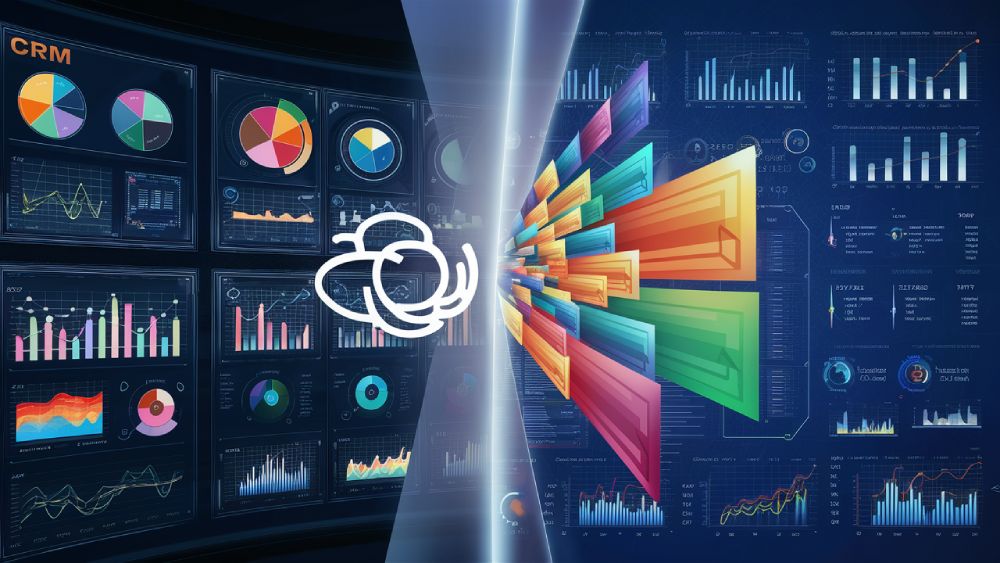CRM Vs Email Marketing: A Winning Combination
When comparing CRM and email promotion, it’s all about understanding their distinct strengths. CRM systems excel at overseeing customer data and cultivating relationships. They offer real-time insights and improve personalization, enhancing customer engagement by monitoring interactions.
On the other hand, email promotion concentrates on constructing targeted lists and carrying out segmented campaigns. It’s budget-friendly, boosts brand recognition, and provides detailed analytics such as open and click-through rates to improve strategies. Integrating both guarantees smooth data synchronization, real-time insights, and optimized lead generation.
To truly enhance your marketing efforts, why not explore how these tools can complement each other?
Key Takeaways
- CRM focuses on managing and nurturing customer relationships through detailed data and interactions.
- Email marketing software specializes in executing targeted campaigns and re-engaging customers through personalized and segmented emails.
- CRM systems provide comprehensive insights into customer behavior and preferences for tailored marketing strategies.
- Email marketing tools offer cost-effective, data-driven campaigns with detailed analytics on open rates, click-through rates, and conversions.
- Integrating CRM and email marketing enhances data synchronization, real-time insights, and overall campaign effectiveness.
Understanding CRM
Understanding CRM is crucial because it involves leveraging customer data to drive customized marketing strategies and optimize business processes. When you delve into CRM, you’re focusing on understanding customer preferences, needs, and purchasing habits. This isn’t just about collecting information; it’s about tracking customer interactions and behavior patterns to identify their wants and needs effectively.
By implementing a robust CRM system, you can streamline processes and optimize interactions to improve customer relationships. You’ll find that CRM isn’t just a tool but a strategy to organize customer information and automate tasks, transforming how your business operates.
Imagine having a centralized database where every customer interaction is logged, providing actionable insights to tailor your marketing efforts.
The primary goal of CRM is to tailor strategies to meet customer needs while boosting business efficiency. By analyzing customer data, you can deploy personalized marketing campaigns that resonate with your audience. CRM systems empower you to enhance customer loyalty through targeted communications and improved service delivery.
Essentially, CRM enables you to build stronger, more profitable customer relationships by making informed decisions based on thorough data analysis.
Exploring Email Marketing
When exploring email marketing, you’ll want to focus on:
- Building targeted email lists
- Crafting effective campaign strategies
- Analyzing performance metrics
By segmenting your audience and delivering personalized content, you can boost engagement and conversion rates.
Utilize analytics tools to measure:
- Open rates
- Click-through rates
- ROI
This will help you refine your approach and achieve better results.
Building Targeted Email Lists
To maximize your email marketing efforts, start by building targeted email lists that capture the contact information of genuinely interested leads or customers. Leveraging CRM and email marketing tools, you can streamline list building by segmenting contacts based on demographics, behavior, and preferences. This segmentation is essential because it allows you to deliver personalized content tailored to specific audience segments, enhancing engagement and conversion rates.
Data shows that targeted email lists can greatly boost your metrics. According to industry studies, segmented email campaigns can result in a 14.31% higher open rate and a 100.95% higher click-through rate compared to non-segmented campaigns. By focusing on list building, you can make sure that your emails reach the right people at the right time, leading to increased ROI and customer retention.
Effective list building involves more than just collecting email addresses. Use sign-up forms, landing pages, and social media to attract subscribers genuinely interested in your offerings. Implementing double opt-in methods ensures higher quality leads, reducing bounce rates.
Effective Campaign Strategies
After constructing a strong, targeted email list, it’s time to harness effective campaign strategies that leverage segmentation, personalization, and A/B testing to maximize engagement and ROI.
Start by segmenting your list into specific groups based on demographics, behavior, or purchase history. Segmented email campaigns can yield 14.31% higher open rates and an impressive 100.95% higher click-through rates. This segmentation guarantees your messages are relevant, increasing the likelihood of engagement.
Next, focus on personalized emails. Data shows that personalized email campaigns can boost transaction rates by up to six times compared to generic emails. Tailoring content to individual preferences and behaviors not only strengthens your Customer Relationship Management but also makes your audience feel valued.
Incorporate A/B testing to fine-tune your email marketing campaigns. Experiment with different subject lines, call-to-action buttons, and email designs. Effective A/B testing can result in a 49% increase in open rates and a staggering 103% increase in click-through rates.
Don’t underestimate the power of triggered emails either; with an open rate of 45.7%, these timely messages are incredibly effective in capturing attention when it matters most.
Performance Metrics Analysis
Understanding important performance metrics in email marketing is essential for optimizing your campaigns and driving higher engagement rates. Performance metrics like open rate, click-through rate, and conversion rate provide critical insights into how well your email campaigns are resonating with your customers.
Open rate, for instance, measures the percentage of recipients who opened an email out of the total sent. A higher open rate indicates that your subject lines are compelling and your customer base is engaged.
Meanwhile, the click-through rate (CTR) shows the percentage of recipients who clicked on a link within the email. A robust CTR signifies that your content is relevant and enticing enough to prompt further action.
Next, the conversion rate is a key metric that measures the percentage of recipients who completed a desired action, such as making a purchase or signing up for a webinar. This metric directly correlates with your campaign’s ROI and effectiveness.
Don’t overlook the bounce rate and unsubscribe rate either. The bounce rate indicates the percentage of emails that couldn’t be delivered, while the unsubscribe rate reveals how many customers opted out of your mailing list.
Monitoring these performance metrics helps you refine your email campaigns for better engagement and results, ultimately driving your business forward.
Key CRM Features
With strong contact management, seamless sales tracking, and automated workflows, CRM systems streamline customer interactions and boost operational efficiency.
Unlike email marketing tools that focus on campaign execution, CRMs provide a thorough solution for managing every aspect of your customer relationships. By leveraging CRM, you can store and organize customer information efficiently, making sure that no detail is overlooked.
Sales management capabilities within CRM platforms allow you to track sales activities and potential leads meticulously. This detailed visibility ensures that your sales pipeline is always optimized, enabling your team to prioritize high-value prospects.
Automated workflows take routine tasks off your plate, from setting reminders to scheduling follow-up tasks, freeing up your time for more strategic activities.
Project management functionalities in CRM systems enable you to organize emails, tasks, and meetings by project. This level of organization ensures that all customer interactions are coherent and timely.
Additionally, CRM software enhances customer service by providing a centralized platform for addressing customer issues promptly and effectively.
Email Marketing Benefits
Email marketing delivers an impressive return on investment (ROI), generating an average of $42 for every dollar spent, making it an indispensable tool in your digital marketing arsenal. By leveraging this powerful strategy, you can reach a large audience with minimal expenses, guaranteeing your marketing budget stretches further than ever.
One of the standout benefits of email marketing is the ability to create highly targeted campaigns. You can segment your audience based on demographics, behaviors, or purchase history, allowing you to send personalized content that resonates with each recipient. This targeted approach leads to higher engagement rates, as your messages align more closely with your audience’s interests and needs.
Moreover, email marketing provides detailed analytics and conversion tracking. You’ll gain valuable insights into open rates, click-through rates, and conversion metrics, enabling you to measure the performance of your campaigns and make data-driven decisions. This level of measurability guarantees you can continually refine your strategy for optimal outcomes.
Here are some key benefits of email marketing:
- Cost-effective strategy: Much more economical than traditional marketing methods.
- Enhanced brand awareness: Repeated exposure to your audience builds familiarity and trust.
- Personalization: Customize your messages to individual subscribers for maximum impact.
Incorporating email marketing into your strategy ensures you can effectively engage your audience and maximize your marketing return on investment.
CRM Vs Email Marketing
How do you decide between leveraging a CRM system or focusing on email marketing when both are pivotal in driving your business’s success? Understanding their distinct capabilities can help you make an informed choice.
CRM systems excel in managing customer relationships, identifying sales opportunities, and tracking service issues. They’re designed to nurture leads through the sales pipeline, ensuring seamless interactions and fostering long-term customer loyalty.
On the other hand, email marketing software specializes in building email lists and executing targeted campaigns. This tool allows you to engage specific audiences with personalized content, driving sales and nurturing relationships. It’s particularly effective for re-engaging dormant customers or promoting new products.
Both CRM and email marketing tools are essential for achieving your marketing goals and building trust with your audience. A CRM helps you maintain a detailed view of customer interactions, whereas email marketing software focuses on delivering timely, relevant messages.
Deciding between the two depends on your immediate needs: if you’re looking to streamline customer interactions, a CRM is invaluable. However, if your goal is to execute targeted email campaigns, email marketing software is your go-to.
Balancing these tools effectively can greatly enhance your overall marketing strategy.
Integrating CRM and Email Marketing
Integrating CRM and email marketing guarantees seamless data synchronization, allowing you to leverage real-time customer insights for more effective campaigns.
Enhanced campaign tracking means you can monitor customer interactions and adjust strategies on the fly.
Streamlined marketing automation not only saves time but also boosts lead generation and conversion rates.
Seamless Data Synchronization
Synchronizing data between CRM and email marketing platforms guarantees your customer information remains accurate and up-to-date, empowering you to craft highly personalized and effective email campaigns. This seamless data synchronization integrates customer interactions from your CRM directly into your email marketing system, ensuring you’re working with the most current data.
By integrating CRM and email marketing, you can:
- Enhance Personalization: Leverage CRM data insights to tailor email content to individual customer preferences and behaviors.
- Streamline Communication: Align customer touchpoints with targeted email content, creating a cohesive and timely customer journey.
- Boost Efficiency: Automate data updates across both systems, reducing manual entry and minimizing errors.
Seamless data synchronization means your marketing team is armed with the latest customer information, making it easier to segment audiences and deliver relevant messaging. This not only improves customer engagement but also enhances overall marketing effectiveness.
When your CRM and email marketing platforms are in sync, you can identify trends and opportunities quickly, allowing for agile campaign adjustments. Ultimately, the integration fosters a more efficient workflow, enabling you to focus on strategic initiatives rather than data management.
Enhanced Campaign Tracking
By merging CRM data with email marketing campaigns, you gain unparalleled insights into customer interactions that enhance your ability to track and analyze campaign performance. Integrating your CRM with advanced email marketing tools allows for real-time campaign tracking, giving you a complete view of customer engagement metrics such as email opens, clicks, and conversions.
Using CRM data, you can measure the effectiveness of your marketing efforts with precision. For instance, tracking which emails are opened and which links are clicked provides valuable customer insights that inform your strategy. This data helps you understand customer preferences and behaviors, enabling you to tailor future campaigns for maximum impact.
Integration also allows for personalized email content, increasing relevance and engagement. By leveraging customer data stored in your CRM, you can segment your audience and deliver targeted messages that resonate. This level of personalization not only enhances customer experience but also boosts campaign effectiveness.
The combined data from both platforms offers a holistic approach to campaign tracking, ultimately optimizing your marketing efforts for better results and ROI. With these insights, you can continually refine your strategies, ensuring that your marketing initiatives are both data-driven and customer-focused.
Streamlined Marketing Automation
Often, leveraging the power of CRM and email marketing together can transform your marketing automation, aligning customer data with personalized communication strategies for maximum impact. By integrating CRM with email marketing platforms, you can create hyper-targeted campaigns based on real-time customer insights and interactions. This seamless integration empowers your business to automate lead nurturing, track engagement and enhance overall marketing effectiveness.
With CRM-email marketing automation, you’ll experience:
- Personalized Campaigns: Tailor your emails to individual customer preferences and behaviors, increasing relevance and engagement.
- Automated Workflows: Streamline repetitive tasks such as follow-up emails and lead scoring, saving time and resources.
- Enhanced Tracking: Monitor customer interactions and campaign performance with detailed analytics, driving data-driven decisions.
Combining CRM and email marketing isn’t just about efficiency; it’s about delivering the right message at the right time. This synergy leads to better ROI, increased customer retention, and more substantial sales opportunities. You can build stronger relationships with your audience by consistently providing relevant content that drives conversions.
Ultimately, integrating these tools into your marketing automation strategy guarantees you stay ahead in a competitive landscape.
Choosing the Right Tool
When selecting between CRM and email marketing tools, start by aligning your choice with your specific business goals and objectives. For business growth and effective customer communication, understanding the nuances between CRM vs Email Marketing tools is essential. CRMs are designed to manage customer relationships, providing a detailed view of your interactions and sales pipeline. Email marketing tools, on the other hand, focus on creating and delivering targeted email campaigns.
Consider the following factors:
- Features and Functionalities: Evaluate each tool’s capabilities. CRMs often include contact management, sales tracking, and customer service, while email marketing tools specialize in campaign creation, segmentation, and analytics.
- Scalability and Integration: Make sure the tool can grow with your business and integrate seamlessly with your existing systems.
- User Experience: Prioritize ease of use to facilitate smooth adoption within your organization.
- Feedback: Seek user reviews and expert opinions to gauge real-world performance.
Here’s a comparative table to help you decide:
| Criteria | CRM | Email Marketing |
|---|---|---|
| Primary Use | Customer relationship management | Email campaign management |
| Key Features | Contact management, sales tracking | Campaign creation, segmentation |
| Scalability | High | Moderate |
| Ease of Use | Varies by tool | Generally user-friendly |
Aligning your tools with your business needs ensures maximum performance and maximizes your growth potential.
Best Practices and Tips
To maximize the impact of your email marketing campaigns, leverage data-driven strategies like personalization and segmentation. Personalized email content can greatly boost engagement, with personalized emails seeing an 18.8% open rate compared to 13.1% for non-personalized ones.
Segmentation is another powerful tool; by targeting specific audience groups, you can achieve a remarkable 760% increase in revenue.
Automation can streamline your efforts and enhance performance. Automated emails boast a 70.5% higher open rate and a 152% higher click-through rate than non-automated emails.
Implementing A/B testing for email subject lines, especially using emojis, can further optimize open rates, with a 56% higher open rate for subject lines featuring emojis.
Consider these best practices for your email marketing campaigns:
- Personalize Content: Tailor your emails to individual recipients to increase engagement.
- Leverage Segmentation: Target specific audience groups to maximize revenue.
- Utilize Automation: Streamline your campaigns to achieve higher open and click-through rates.
Monitor key performance metrics like open rates, click-through rates, and conversion rates to continually refine your strategy.
Frequently Asked Questions
Are CRM and Email Marketing the Same?
You might think CRM and email marketing are identical, but they’re not. CRM manages customer interactions and data, while email marketing targets audiences with campaigns. Integrate both for enhanced lead generation and streamlined sales processes.
What Is the Difference Between CRM and EDM?
You’re comparing CRM and EDM: CRM manages customer relationships and tracks sales pipelines, while EDM focuses on targeted email campaigns. Integrating both maximizes lead generation and sales growth. Use CRM for nurturing; use EDM for promotion.
What Is the Difference Between CRM and Email Service Provider?
Think of CRM as the brain managing customer relationships and sales pipelines, while an Email Service Provider is the heart pumping out targeted email campaigns. CRM organizes leads and contacts; ESPs excel in list building and campaign execution.
What Is the Difference Between CRM and Marketing?
CRM focuses on managing customer relationships and sales pipelines, while marketing encompasses broader strategies, including market research, advertising, and branding. You’ll find CRM automates customer interactions; marketing drives overall brand awareness and demand generation.
Best Practices for Success: Seamlessly Synchronizing CRM and Email Marketing
Ultimately, understanding CRM and email marketing‘s distinct yet complementary roles can vastly streamline your strategy.
CRM systems simplify customer segmentation, while email marketing amplifies audience engagement. Integrating these tools can turbocharge your sales funnel.
Select solutions that suit your specific needs and seamlessly synchronize them for stellar success. Stick to best practices for sensational results.
Data shows that companies combining CRM with email marketing see a 45% boost in customer retention. So, strategize smartly and see your sales soar.







